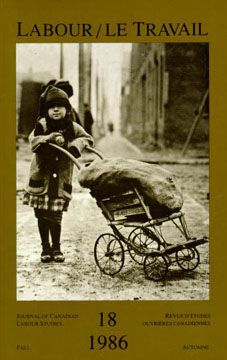Abstract
THE FIRST DECADES of the twentieth century saw some significant changes in the nature of office work. Large numbers of employees were added to the payroll, jobs were broken down into their component parts, and women were brought in to fill the lowest positions. Relatively little attention has been paid, however, as to how the introduction of these changes varied from industry to industry or from region to region. This study of the conditions of employment at the Banque d'Hochelaga indicates that bank workers, unlike other white-collar employees, were faced with the instability that came from being regularly moved from branch to branch, In other regards, the working conditions faced by the employees of the Hochelaga differed from those for the industry as a whole because of the recruitment of the Hochelaga's work force from a French-speaking labour market.
LES PREMIÈRES DÉCENNIES du vingtième siècle furent témoins de profonds changements dans la nature du travail de bureau. Un grand nombre d'employés(es) s'ajoutèrent aux listes de paie, les tâches furent fragmentées dans leurs parties constituantes, et les femmes vinrent remplir les postes inférieurs. On a cependant peu porté attention à la façon dont l'introduction de ces changements variaient d'une industrie à l'autre et de région en région. Cette étude des conditions d'emploi à la Banque d'Hochelaga indique que les employées de banque, contrairement aux autres cols blancs, devaient subir l'instabilité liée aux fréquents changements d'une succursale à une autre. À d'autres égards, les conditions de travail des employés de la Banque d'Hochelaga différaient de ceux de l'ensemble du secteur banquaire en ce que le recrutement se faisait dans un marché de travail francophone.
